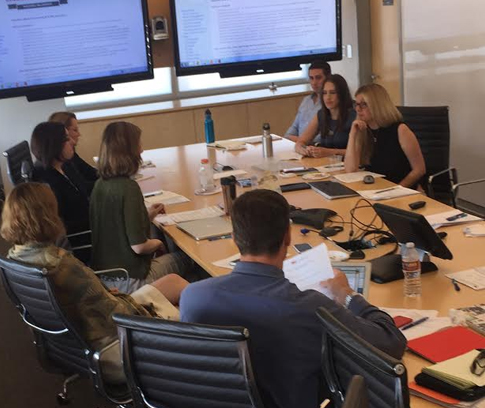
Teaching can be tough, no matter what age group you’re working with. Even in higher education, being an instructor without a professional support system in place can quickly lead to frustrations or burnout when it comes to time inside and outside of the classroom. At Sustainability Science Education (SSE), our goal is to provide our educators with the necessary tools and community to be successful Faculty Associates, while cultivating qualified facilitators and discussion leaders. To provide this necessary and beneficial system, we’ve developed a hybrid professional learning community (PLC) called the SCN 400 Teaching Fellowship.
According to Dr. Richard DuFour (2004), a field expert on collaborative learning and teaching, “the powerful collaboration that characterizes professional learning communities is a systematic process in which teachers work together to analyze and improve their classroom practice.” SSE takes this sentiment to heart. We place an emphasis on collaboration rather than teaching in isolation, and encourage ongoing analysis of successes and failures in teaching practices and student achievement. Although the term “PLC” can apply to numerous different types of groups — from curriculum committees at district offices, to a set of 4th grade teachers who team-teach — the idea and goals should uniform across the board. It supports the notion that “the core mission of formal education is not simply to ensure that students are taught, but to ensure that they learn” (DuFour, 2004). By working in a collaborative team environment that is constantly considering whether or not the student audience is benefiting from lessons and techniques, PLCs should be able to quickly and efficiently modify their practices to fit their target.
 Traditionally, PLCs take the form of face-to-face meetings either on a weekly, monthly, or quarterly basis, but sometimes that’s not enough. Our answer to this is a hybrid PLC, where there are in-person components on a regular basis in addition to an online library of content that can supplement knowledge throughout the day. Quite a bit of time and work was invested up front to put our PLC wiki together, but it pays off semester after semester as the process becomes more streamlined. On the wiki, a substantial database of pertinent information has been built, including a week-by-week curriculum guide that all instructors follow. These curriculum guides summarize the focus of each class through an introduction prompt, a brief audio file narrating the topic and lesson, classroom management techniques for each day, related state standards, and the actual lesson plan that divides out the in-class time in detail. Additionally, this wiki has a section on tips for success, a “know your student” page, email templates that instructors can use for standardized correspondence with individual students, detailed (and regularly updated) calendars for each week, and PowerPoint support presentations that go beyond our normal curriculum to act as interventions for students and classes who are struggling with time and stress management, digital citizenship, and other topics.
Traditionally, PLCs take the form of face-to-face meetings either on a weekly, monthly, or quarterly basis, but sometimes that’s not enough. Our answer to this is a hybrid PLC, where there are in-person components on a regular basis in addition to an online library of content that can supplement knowledge throughout the day. Quite a bit of time and work was invested up front to put our PLC wiki together, but it pays off semester after semester as the process becomes more streamlined. On the wiki, a substantial database of pertinent information has been built, including a week-by-week curriculum guide that all instructors follow. These curriculum guides summarize the focus of each class through an introduction prompt, a brief audio file narrating the topic and lesson, classroom management techniques for each day, related state standards, and the actual lesson plan that divides out the in-class time in detail. Additionally, this wiki has a section on tips for success, a “know your student” page, email templates that instructors can use for standardized correspondence with individual students, detailed (and regularly updated) calendars for each week, and PowerPoint support presentations that go beyond our normal curriculum to act as interventions for students and classes who are struggling with time and stress management, digital citizenship, and other topics.
Finally, instructors meet weekly to develop a shared vision of purpose, and work together to fine-tune all prepared lessons and materials. This is a face-to-face chance to collaborate on best practices in the classroom and evaluate how lessons and topics can be re-conceptualized for different learning audiences. Detailed notes are taken and considered for the following week and semesters to come. When surveyed regarding the face-to-face elements of our PLC, instructors reported that they benefited from building rapport with others, the sharing of knowledge, the opportunity to lend and receive advice. Through this feedback, it’s easy to see that “Professional Learning Communities” are properly named, as they are in fact a community. As we progress further into the 21st century, SSE believes that it’s inevitable that we will see more and more PLCs develop in the hybrid and all-online format in order to adapt to the technology and time demands of our professions.
-
